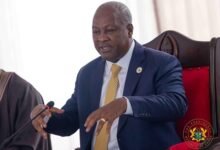
Pre-tertiary education teacher unions in Ghana want political parties to include in their election manifestoes a review of the Free Senior High School/ Technical, Vocational and Training (SHS/TVET) programme for its intended results to be achieved.
In addition, they want the policy to be depoliticised and made a national initiative that would be implemented within the parameters of Article 25(1) (b) of the 1992 constitution and supervised by the Ghana Education Service and not the Free SHS Secretariat.

The Ghana National Association of Teachers (GNAT); the National Association of Graduate Teachers (NAGRAT) and the Coalition of Concerned Teachers Ghana (CCT-GH) are of the view that these recommendations, if considered, would improve the quality of pre-tertiary education.
The Free SHS review is one of five issues and recommendations captured in a document titled “Demands to the political parties on education delivery in the country for consideration and incorporation into their election manifestoes” launched by the unions in Accra yesterday.
The GNAT General Secretary, Thomas Musah, is a co-signatory to the 13-page document alongside the NAGRAT President, Eric Angel Carbonu, and CCT-GH President, King Awudu.
He explained to The Ghanaian Times that the document was put together because for many years, they had not been able to hold the government accountable for their promises because the ideas and policies had emanated from the politicians, often times, leading to poor learning outcomes.
This time, he said, they were presenting issues of concern in the sector and solutions to guide politicians to make informed and effective policy decisions.
“The document is to further get the political parties to commit themselves to stipulations on education covered in their manifestoes, and to be held accountable, when they fail to deliver them,” he said.
The document, said the unions, was concerned about public perception that most educational policies were intended to win votes and not to improve quality, with the policy formulators unable to interpret them coherently.
It said education policies were not allowed to run their full lengths of implementation, hence not subjected to evaluation of their successes or otherwise as basis for the formulation of further policies.
On the Free SHS/TVET review, the unions said the policy had improved access and participation, but budgetary allocation did not meet enrolment figures, which meant there was a decline in education financing.
They also cited the government’s struggle with expenditure on the implementation of the policy, and human and infrastructural resources to match patronage, thereby resulting in double track system.
To address these challenges, the unions recommended that stakeholders, including parents, should be allowed to contribute to the effective running of schools while school heads should not be held accountable for lapses in the policy.
Other issues raised in the document are the need for curriculum reform for teacher education; the use of the first language as medium of instruction from Kindergarten one to Basic Six; the use of Information Communication and Technology for teaching and learning and improvement of Science, Technology, and Engineering and Mathematics education.
The Unions also touched on demand for learning materials; prompt payment of capitation grant; depoliticisation of the school feeding programme and provision of free sanitary pads and better conditions of service for teachers.
BY JONATHAN DONKOR







